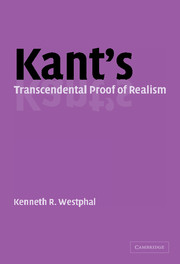Book contents
- Frontmatter
- Contents
- Acknowledgments
- List of abbreviations
- Introduction
- 1 Kant's methods: transcendental and epistemic reflection
- 2 The metaphysics of Kant's transcendental idealism
- 3 Transcendental affinity
- 4 The gap in Kant's Critique of Pure Reason
- 5 Kant's dynamic misconstructions
- 6 Kant's metaphysical proof of the Law of Inertia
- 7 Three Kantian insights
- Appendix
- Bibliography
- Index of names
- Index of subjects
Appendix
Published online by Cambridge University Press: 06 November 2009
- Frontmatter
- Contents
- Acknowledgments
- List of abbreviations
- Introduction
- 1 Kant's methods: transcendental and epistemic reflection
- 2 The metaphysics of Kant's transcendental idealism
- 3 Transcendental affinity
- 4 The gap in Kant's Critique of Pure Reason
- 5 Kant's dynamic misconstructions
- 6 Kant's metaphysical proof of the Law of Inertia
- 7 Three Kantian insights
- Appendix
- Bibliography
- Index of names
- Index of subjects
Summary
SUMMARY OF KANT'S TRANSCENDENTAL PROOF OF THE LEGITIMACY OF CAUSAL JUDGMENTS.
For reasons stated in the Introduction, this study has discussed only the necessary minimum about Kant's Transcendental Deduction. Likewise, it has said only the necessary minimum about Kant's analysis of the role of causal judgment in time-determination in the Analogies. This crucial topic has been greatly clarified in available literature. Presently what I can add to it I have added in the foregoing. Adding significantly to it requires thoroughly rethinking Kant's Deduction and Analogies in the ways indicated in the Introduction. However, readers who do not have these issues fresh in mind may be helped by a very brief summary of the main line of Kant's transcendental justification of causal judgments. I offer this summary here as a guide for reflection; it is not, as it stands, a sound argument. I gratefully acknowledge that it is based on a briefer summary for undergraduates developed by Keith Yandell.
Kant's opponent in this argument is “material idealism … the theory which declares the existence of objects in space outside us either to be merely doubtful and indemonstrable or to be false and impossible” (B274). Kant names Descartes and Berkeley, though Hume belongs here too. Kant aims to show that unless we can and do make at least some justified causal judgments about physical objects, we could not be aware of so much as an apparent temporal sequence of apparent events.
- Type
- Chapter
- Information
- Kant's Transcendental Proof of Realism , pp. 269 - 274Publisher: Cambridge University PressPrint publication year: 2004



